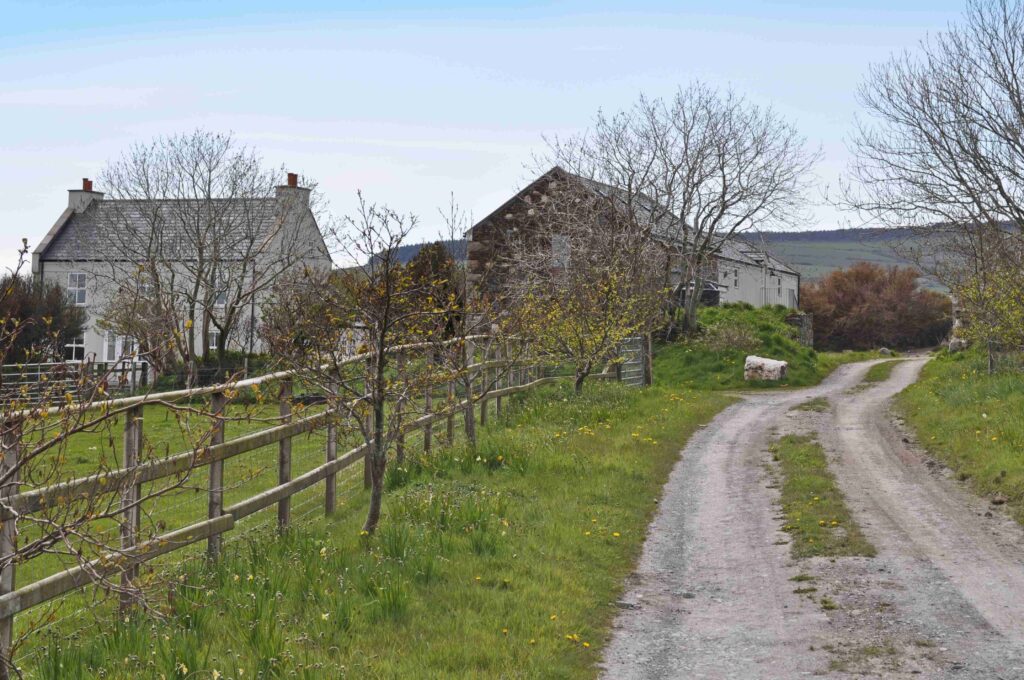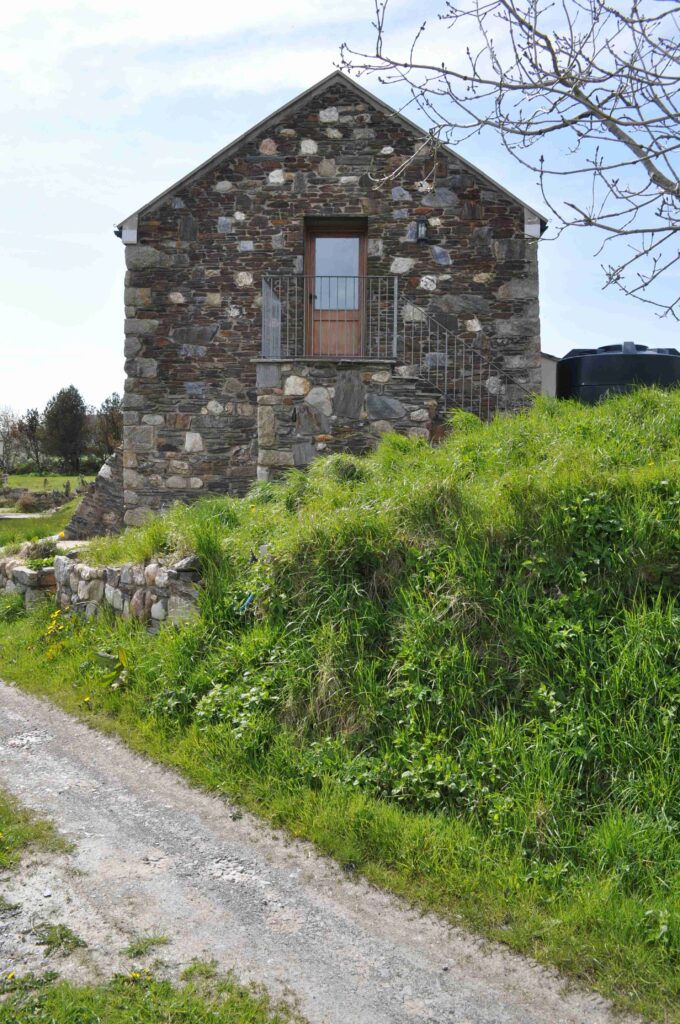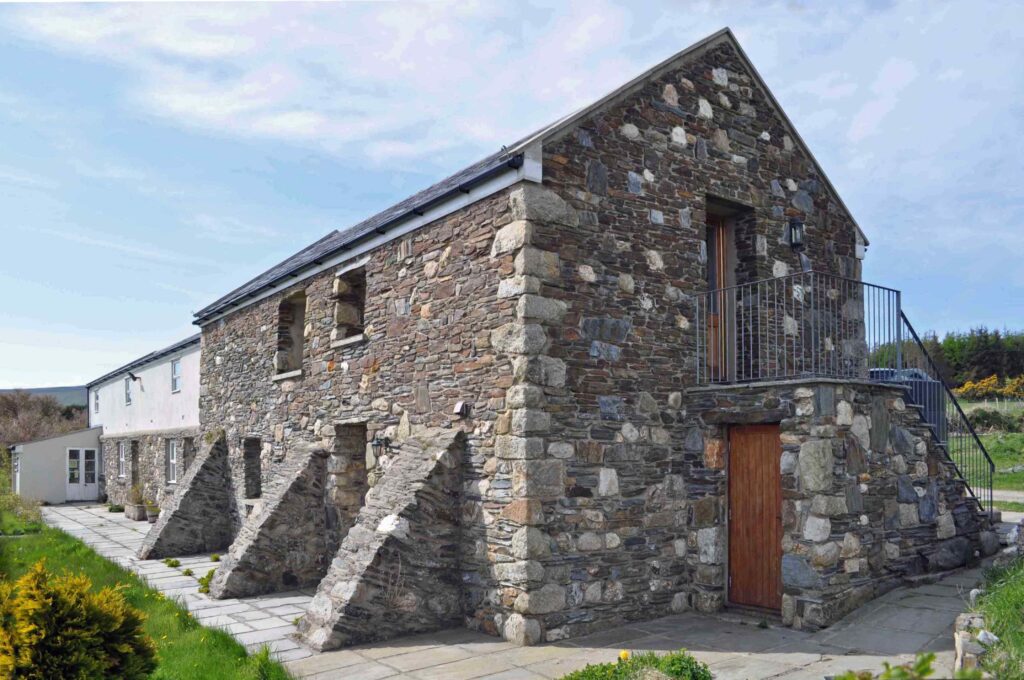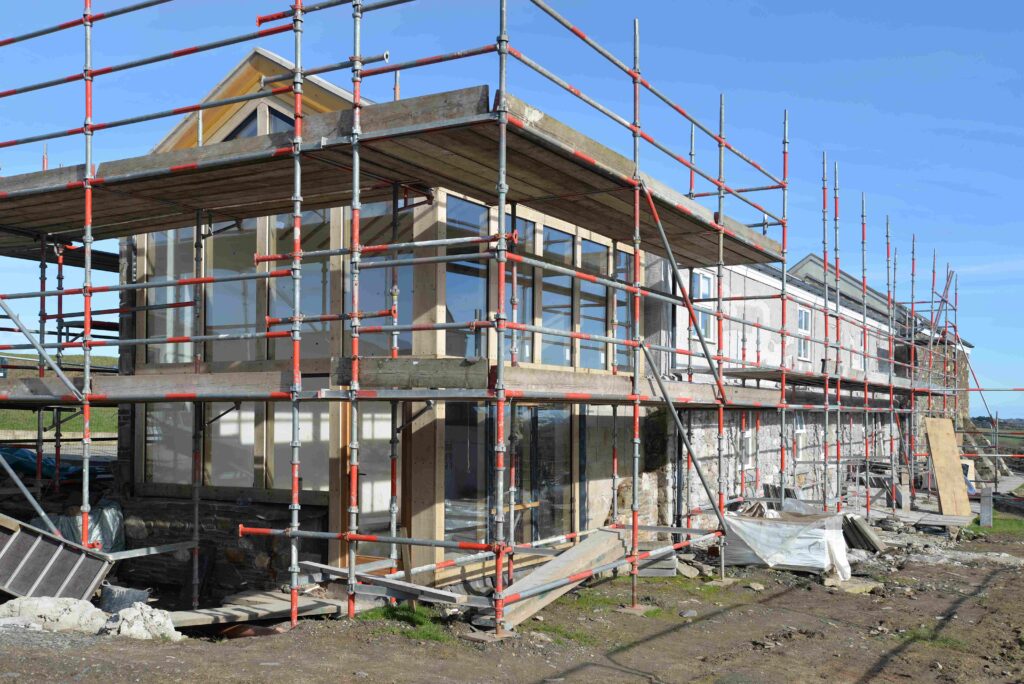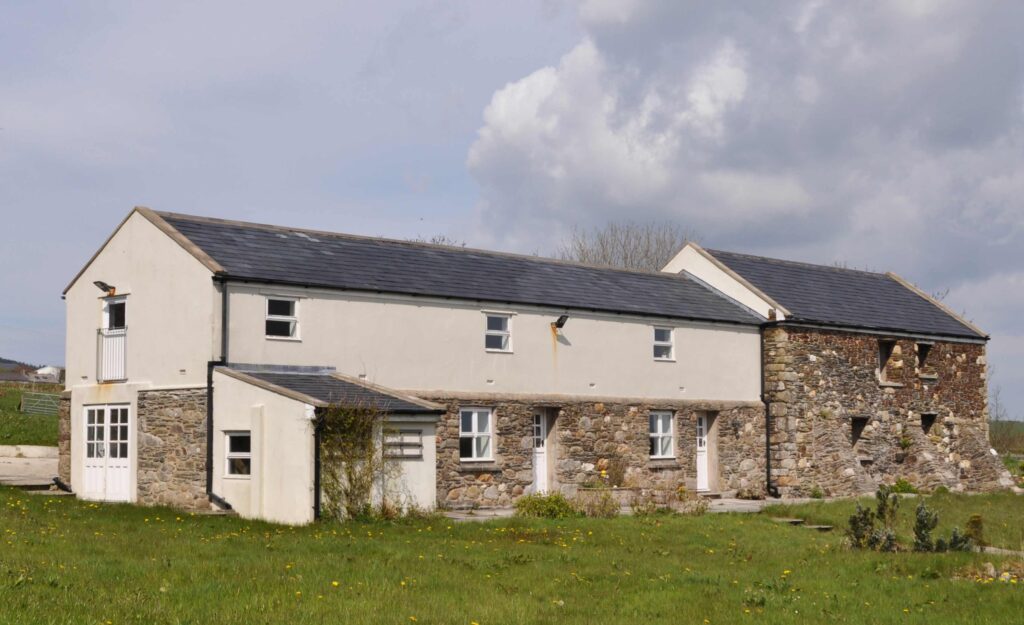Our History
An idea is born
By R Paul Davis
I was not, and am not, a farmer, but my wife Monica and I have rural roots, love the countryside, and greatly admire the contributions that farmers make to society every day.
We were feeling, as the second decade of the 2000s got under way, that life and the world had been very good to us indeed. We both came from happy, loving families; we have happy, loving children. I had enjoyed many successes in my career as a lawyer and businessman. In 2000, I sold my growing business (Accu-Rate Corp) for several million dollars, moved to Shannon, and set up a European branch for the PacNet Services Group. I was supposed to stay for two years, but it became three, then five. By 2006, I was longing to settle elsewhere, but was persuaded to stay in Ireland for a couple more years. We moved temporarily to Oxford so that I could complete flight training and the exams to qualify as an airline pilot.
In January 2009. I resigned as Managing Director of PacNet’s European operations in Shannon but continued as General Counsel to the group. I set up Counting House on the Isle of Man, a legal and practical consultancy for the gaming industry.
One fateful weekend in 2011 we visited “Odds Farm Park”, a Rare Breeds farm in the midland countryside. We were greatly impressed by what we saw – a collection of native breed cattle, sheep and pigs, all in danger of extinction and all with their own unique qualities. I became aware for the first time of the RBST, the crisis of extinction facing Britain’s traditional farm animals, and the dangers posed by disease and commercialism. We decided to try to make a difference. We loved the island; we loved the countryside; and we remembered our admiration for the noble purpose of Odds Farm. We wanted to start “giving something back to the world” and the idea of the Manx Ark was born.
The theory was this. British native breeds of cattle, sheep, pigs, horses and goats are dying out. Each year the Rare Breeds Survival Trust (patron HRH Prince (now King) Charles) publishes a “watchlist” of breeds that are in danger of disappearing forever. All of these have unique qualities that should not be lost; most are not commercially viable enough to survive. Only enthusiasts will keep them going. The Isle of Man, which is TB-free, and where the entire sheep population is free of the devastating diseases that ravage British flocks, is an ideal sanctuary to establish high- quality breeding lines of the most endangered animals on the planet. The Irish Sea, which surrounds the island, forms a natural barrier. When disease strikes in the UK, as Foot & Mouth Disease has in the past, all transportation of animals stops, making the island an ideal place to preserve animals which could form the basis of future herds and flocks. We contacted the RBST, received an enthusiastic welcome from field officers Ruth Dalton and Richard Broad, and the Manx Ark took a huge step forward.
Our signature herd was to be the Northern Dairy Shorthorn, then the second-rarest British cattle breed in existence. There were less than 50 registered animals alive in the UK at the time, a critical situation. Once the most prolific cow on the Isle of Man, there were now none left.
In 2012, we had no farm. We didn’t even have land. But we had an enthusiastic friend, Sam Alder, famously known as “Telegram Sam” (in the T-Rex song). Sam had around 600 acres of land on Onchan in the middle of the island and offered the use of his fields for the first winter.
We met Tracey Jaine, one of a handful of breeders with pedigree stock, and in April, 2012, we agreed the purchase of a half dozen heifers, in-calf. At Christmas our first island-born calf made his appearance, and Rudolph entered the annals of history.
Every September, the seminal event of Rare Breeds supporters takes place. It’s the annual Rare Breeds Show and Sale at Melton Mowbray, in the heart of the English midlands. I attended and talked to breeders. During a lunchtime refreshment break I was introduced to George Steriopulos, who had recently left the Island. George had left behind a 40-acre farm “Ballaloaghtan” on South Barrule, and owned about 100 acres of rough grazing land nearby. Discussions commenced over lunch, and were concluded about a week later. Monica and I acquired both parcels and, in April 2013, full of hope, we took over control of the two farms in the South of the Isle of Man. With those farms came our starter flock of Manx Loaghtan sheep, the only indigenous breed remaining on the island, and itself endangered almost to the point of extinction.
We followed up with a purchase of a purebred bull and all Tracey’s remaining heifers in May, 2013.
We needed a farm manager for all this stock. The doubters on the Isle of Man told us we’d never find anyone. They were wrong; we got very lucky. After advertising and interviewing, we were able to hire Chris Wade, a lifelong cattle expert from a Manx farming family. He joined us in April 2013 on a part time basis, but it rapidly became apparent that there was full time work for him. Chris has been with us ever since. he has emerged as an authority on shorthorn cattle and learned more than we will ever know about primitive sheep.
2014 calving gave us five new NDS calves, but only two proved to be productive as our first twins included a freemartin. We kept one bull calf, Anderson, “intact” to service the daughters of Braddan Nomad, and by the end of 2015 our NDS herd stood at 40 head.
From 2014 to 2016 we also conducted several importations of sheep, cattle and even half a dozen “large black” pigs. By early 2016, our farming operation boasted four breeds of cattle, 13 of sheep, and those “large black” pigs, all happily grazing and breeding away from extinction. Every breed has a story to tell; every breed deserves special consideration and deserves to survive. And every single one is “un-commercial” for one reason or another and that is why they’re dying out – farmers who need to make a living simply don’t want the breeds which do not perform well in a commercial sense.
Growing a closed herd is never easy. As 2016 dawned, we were confronted with potential in-breeding issues as a large percentage of our breeding stock was related to our working bulls. The Isle of Man has strict standards for importation; on-farm-collected semen is not allowed to land within our borders. For the NDS, there was no “export quality” (on-station collected) semen available at all, so we sponsored a project to collect from a relatively unrelated bull (Philpott Sampson) in the West Country.
By 2019, there were around 70 purebred NDS cattle on the Isle of Man alone, and the world population had swelled to over 120 – a real success story. But they were still fragile and need love and special care to thrive.
Building and Tourism Development
In late Summer 2013, we applied for permission to build the first of several planned animal shelters, and received it during the Autumn. We completed building a shed at Ballaloaghtan the following Spring, and it provided shelter for the NDS cattle that winter. The next year, the shed was used differently – and to great effect – as a rotational lambing station for the growing numbers of sheep. Lambing indoors cut losses to a minimum and gave tight control over the birthing conditions of the ewes.
Over the winter of 2015-16, we embarked on, and virtually finished, two major building projects. The first was the erection of two cattle sheds and a sileage clamp at Glen Moar (now re-named BallaDaniel). The other was the conversion of the 18th-century Manx stone barn, at Ballaloaghtan, into a serviced tourist residence capable of housing up to 13 people. With an award-winning design by my brother Tim and the addition of a conservatory, it was widely acknowledged as the finest tourist accommodation on the island. It had, and continues to receive, rave reviews from guests visiting from all over the world. It will never, ever make a profit justifying the investment – but it continues to make a small contribution to the running costs of the farm and the preservation of our animal breeds.
Meat Sales
A fact of life on the farm is that you can’t keep all the animals that are born. A flock of sheep will produce boys and girls – but you only need to keep one male for every 50 females. As the flocks grew, this produced a steady supply of high-quality rare breeds meat. We developed a close relationship with the Xiummri family, who own “The Forge” and “The Abbey” restaurants on the island. They serve rare breeds meat to their customers throughout the year.
Truly, one of the best ways to preserve a breed is to create a demand for its meat.
Working with Other Rare Breeds Farmers
Going it alone would have been difficult. From the outset, we worked hard to identify other farmers with an interest in traditional breeds, and helped them in various ways. When doing importations, which are intensely bureaucratic and difficult (not to mention expensive), we brought in numerous animals for other farmers, notably Golden Guernsey goats. And over time, several smallholders and large farmers contacted us to secure stocks of animals of interest to them.
The world loves a bargain! Perhaps not surprisingly, we found that we were particularly successful in encouraging fellow breeders by giving away attractive stock – a worthwhile investment as several noble animals have found new homes and been cherished by new owners. We donated starter flocks of Hill Radnor and Soay Sheep, a breeding pair of Large Black pigs, and other animals, to other farmers interested in making their own contribution.
Washington drops a nuclear bomb
In September 2016, disaster struck from the most unlikely source. In my “day job”, I was in-house lawyer (“General Counsel”) for a financial services company named PacNet. It was alleged by the United States Postal Inspection Service to have knowingly facilitated fraudulent activities of some of its clients. In an unprecedented move, the USPIS went to the US Department of Treasury’s “Office of Foreign Assets Control” (OFAC) and wrongly persuaded the acting Director to designate the PacNet Group as a transnational criminal organization. Some 33 companies and 12 people in the PacNet Group were wrongly added to the lists of “specially designated nationals” and prevented from any dealing with US persons or banks. Our names were administratively added, without any opportunity for us to contest it, to the US’s list of the world’s worst terrorists, drug traffickers and people smugglers.
We cannot begin to imagine why the US Treasury decided to sanction Manx Rare Breeds via the OFAC mechanism. The answer probably comes down to inadequate, sloppy, uncaring “research”. My wife Monica and I were the two directors of Manx Rare Breeds, easily found on the public register. OFAC’s interest in me was related to PacNet Services, the company which I represented as counsel; Monica was also a director of PacNet Brazil. So when “the list” was put together for designations, the farm was an easy target. How or why anyone could have considered the farm as a threat to US national security or the US economy is beyond imagination.
But the OFAC people did what they do. For reasons that are impossible to understand, OFAC included our farm in its list of designated companies. The results were profound. Lloyd’s Bank suspended our farm bank account. People who had purchased things from the farm (meat, an entire year’s wool, and even some cattle) refused to pay for them, misunderstanding the reach of the US-centric legislation. The Times newspaper, normally a bastion of truth and accurate reporting, falsely ran a story saying that the farm’s assets had been frozen under a photo of one of my colleagues, Raffaella, at her recent wedding. As a result of the false story in The Times, several customers who owed us money contacted the Isle of Man’s Financial Services Authority for help. Unhelpfully, the FSA told them to “seek legal advice”. Obviously this would have been expensive and foolish – instead, they just didn’t pay us.
Most construction, fencing and maintenance work (by contractors) was winding down; heavy bills needed to be paid; and winter feed stores had to be ordered, collected and paid for. As local media broke the news of the US sanctions, virtually all credit terms were cancelled by local suppliers and, in the midst of the media frenzy, we were forced to run around the countryside paying suppliers in cash or making special arrangements to give them the comfort they needed that they would get paid. Everyone did get paid in the end, and this became a positive talking point in the agricultural community.
Some suppliers who had received payment directly into their own bank accounts – salt-of-the-earth folks whose families have farmed here for generations – were called into their own banks to explain why they had received money from Manx Rare Breeds – now notorious as an OFAC sanctioned company according to the media and the US Government. In all cases there were proper invoices and proper explanations; but this was personally embarrassing and inconvenient for them.
Without a bank account, the farm was unable to receive government grants, farming subsidies, or its quarterly VAT refund. This was an enormous imposition on cash flow and even further impeded the philanthropic work we had taken on.
Our farm manager was retained, gallantly working alone, but his apprentice, a young man who was one of very few on the island studying towards agricultural qualifications, was sadly let go. The farm was forced to speed the slaughter of finished animals and sell off precious breeding stock to guarantee a continuing income to cover the manager’s wages, fuel bills and other costs necessary to running the farm.
OFAC Exits
Within a year, an agreement was reached for all of the US sanctions to be deleted but the damage would last for ever. OFAC specifically agreed in the settlement agreement that I signed for PacNet that the “Manx Rare Breeds Ltd. will not be required to commit to dissolve. Manx Rare Breeds Ltd. is not part of the PacNet Group, has not conducted transactions on behalf of the PacNet Group, and will not undertake any transactions in relation to the wind-down of the PacNet Group.” No apology, just the factual admission and the world moved on. Manx Rare Breeds was de-listed by OFAC on 4th October, 2017, a year and two weeks after its initial designation. But even before that date, the Isle of Man Government decided to take their turn at injustice and harm to good people, and the operation was plunged into further financial crisis.
Collateral Damage
In our early negotiations with OFAC we were lucky to meet some fine people. Andrea Gacki, who was subsequently promoted to Director of OFAC after a short stint as Acting Director, was receptive to communications and received our approach with humanity and dignity. She relayed our submissions to Tom Jennings, who listened with an open mind to our early description of the massive and unjust injuries suffered by the designated people.
I wish I could use the same adjective for Todd Conklin. A deputy Associate Director with vast OFAC sanctions experience, we challenged Mr Conklin on the unnecessary and violent abuses that had been visited on people like Monica, Raffaella and our UK compliance officer Donna. He replied that they constituted “collateral damage”, and actually took it on himself to describe other actions in which completely innocent people had been sanctioned in order to put pressure on a relative.
Power, as Baron Acton famously observed, tends to corrupt. And absolute power tends to corrupt absolutely. OFAC has unbridled, unilateral power to utterly ruin the lives and mental health of innocent people pursuing its non-judicial goals. This is not collateral damage, which occurs when someone has the bad luck to be standing next to a target. This is deliberate, unlawful bullying of defenceless civilians. Nothing less.
The Isle of Man takes its turn
Unknown to our family, on 1st September 2017, the advocate for the Attorney General to the Isle of Man, Mrs Linda Watts, had made an application to the Court of General Gaol Delivery, the senior criminal court in the island, for a restraint order respecting Manx Rare Breeds, as well as eight other persons and companies including myself and my wife Monica. Extensively citing the publicity which had surrounded the original OFAC sanctions, Mrs. Watts sought to restrain all of the assets on the island of Manx Rare Breeds on the theory that they represented “proceeds of crime”. The order was granted, and for some reason held for three weeks until 21st September. It was then served, by hand, at the company’s head office in Douglas, and received in the early afternoon.
The order against Manx Rare Breeds, presumably drafted by Mrs. Watts, contained two serious errors. First, it made no provision for the company, still an operating farm with some 500 head of livestock, to continue to pay its ordinary operating expenses in order to continue in business. Second, with respect to rents received by the business, it directed that such should be paid into a specific bank account which is held in the name of Paul Davis, not in the name of the business, at Nedbank Private Wealth in the Isle of Man.
It is trite law that the granting of a restraint order pending further action, should take care to allow the continuation of a viable business, and should not be used in an attempt to ruin or punish the business.
I was immediately severely alarmed by the prospect of the farming business being unable to receive its income or pay its bills. I met with Mrs. Watts, first thing in the morning of 22nd September (the day following service of the Order), and advised her of the difficulties created by the Order, and its inherent deficiencies. I confirmed this position by letter later that same day, outlining the income and expenses of the farming operations, and delivered the letter by hand to the Attorney General’s Chambers.
Mrs. Watts initially appeared disposed to help, but pointed out that the Order did not contain provision for payment of normal operating expenses. She further suggested again that all income of the company should be paid into my personal account. This created an impossibility – there was no way that Nedbank would consider payment of company money into a personal account.
In the meantime, however, Mrs. Watts prepared a variation of the Order along the lines she had determined and submitted it to Court. On 25th September, I wrote to Mrs. Watts and advised her that Nedbank would not accept deposits of monies payable to the company into a personal account, and further they had no provision to accept cash. The farm was without a banking solution, and I asked Mrs. Watts to consider withdrawing the application for a variation.
In the event, there was no need for the application to be withdrawn. On September 26th the Court advised Mrs. Watts that the application was unsigned, and there was no proof of my consent. As a result of these additional defects, no further action was taken by the court.
Then, nothing happened. On September 30th, I wrote to Mrs. Watts again, confirming the position and pointing out that bills were now beginning to pile up, as was cash received from farm operations and sales. The terms of the order forbade the use of that cash to pay accounts payable for the farm.
By 1st October 2017, the situation had compounded and I again wrote to Mrs. Watts cordially requesting an acceleration of decision-making. I pointed out that animals needed to be fed and that as the Isle of Man is a small community, word would quickly get around if bills were not paid. Mrs. Watts responded with a single line email “I am working on an alternative solution.” It was never disclosed what that solution might have been.
On 4th October, 2017, Advocate Jerry Carter came on record as representing Manx Rare Breeds and took over the correspondence. Advocate Carter recommended sending copies of the outstanding invoices, which were by now many, to Mrs. Watts as proof of the bona fides of the obligations and their obvious connection to farming operations within the Manx community. This was accomplished immediately and on 10th October, Advocate Carter confirmed the sending of the invoices and urged Mrs. Watts to approve their payment.
This approval was refused in an email on the same day, Mrs. Watts curtly advising Advocate Carter that an application must be made to the Court for any Variation (due to the order having no provision other than for payment of legal expenses).
Desperate to be allowed to pay the farm bills and keep the livestock eating, Advocate Carter and I began the laborious process of preparing a fully reasoned application to the Court. Due to the complexity of the matter and the governing law, much of which is UK authority, we enlisted the services of a senior British silk, John Randall QC, for assistance with the skeleton argument and drafting of the application.
On 14th November, Advocate Carter filed the completed application, along with over 100 pages of exhibits demonstrating the urgent need for a resolution of the farm issue. Many invoices were now nearly two months overdue and over ₤20,000 in cash had accumulated in our family home, which we did not consider to be safe.
Around this time, Advocate Carter had an informal conversation with Mrs. Watts. According to Advocate Carter, Mrs. Watts told him that she was “run off her feet with all these Restraint Orders”, implying that she was not able to cope effectively with the workload generated by them.
Having heard nothing further on 20th November, Advocate Carter wrote again to the court under the heading “Emergency Petition” outlining the dire situation of the farm and asking for urgent consideration. Deemster Montgomerie kindly offered to hear the matter on Friday 24th November, but Advocate Carter telephoned the court and advised that, as he was going to be off island, the matter would have to be postponed. His Honour was scheduled to commence a six-day trial on Monday 27th November and was understandably unavailable for that period, to which Advocate Carter responded “so be it”. It is unfortunate that I did not know of this exchange, as I would have been happy to attend court in person and present the case myself.
The postponed hearing was set down for Friday 8th of December, and His Honour Deemster Montgomerie sent a message suggesting that Advocate Carter should consider approaching Mrs. Watts “to see if any agreement can be reached between the parties …” This sentiment was kindly expressed and the recommendation well received, but His Honour would have been unaware that such attempts had been rebuffed by Mrs. Watts for a period in excess of two months.
Unfortunately, the Isle of Man suffered from snowfall in the morning of 8th December. Although I live in Castletown, I traveled into Douglas to be available for the hearing, as did Monica. Mr. Carter, overcoming a severe physical injury, also made the short journey to the town, but Mrs. Watts did not arrive in Douglas. His Honour the Deemster Montgomerie made the effort to attend by walking to the court in the inclement conditions, but decided that court should be canceled that afternoon in fairness to other attendees who might have difficulty. The matter was re-scheduled for the following Thursday, 14th December.
On Wednesday 13th December, the very eve of the re-scheduled court appearance, Advocate Carter was notified that Mrs. Watts on behalf of the Attorney General had agreed to the terms of the variation proposed in the application and that there was no need to appear in court. The terms of the variation were to all intents and purposes the same as had been discussed on and immediately after 22nd September. It was nearly three months later, and legal costs in excess of ₤20,000 had been incurred to prepare the application, which turned out to be totally, utterly unnecessary.
To this day, no-one knows why Mrs. Watts initially proposed an arrangement for payment of operating expenses of the business, then changed her mind, then ultimately consented to these arrangements after the farm – and its suppliers – had suffered almost three months of financial hiatus and severe stress and anxiety. No explanation or apology was offered.
It took a year of preparation to apply to court for the discharge of these orders and in late 2018 the Deemster Kainth (Manx equivalent of a High Court judge) ruled that the government had not met even the lowest standard of proof required to restrain our assets, and released them all back to us.
Events from December to June, 2018
On 29th June, 2018, a contested matter finally came to Court in the Isle of Man. A half day hearing was set down to deal with the AG’s representative Linda Watts’ attempts to exclude my evidence from the application to discharge all the Restraint Orders, and to exclude the expert evidence of Professor Bernstein on the American legal aspects of OFAC and the designations of 2016.
In a skeleton argument, remarkable only for its irrelevance, Mrs. Watts argued that my evidence should be excluded from the eventual hearing because it contained a great deal of hearsay. Keeping in mind that Watts is the head of the International Cooperation and Asset Recovery division of the Attorney General’s office, this argument is stunning. Section 101 of the Proceeds of Crime Act specifically states that in Restraint Order matters, evidence shall not be excluded on the basis that it is hearsay. It is beyond all imagining how Watts could be head of the division and yet not know this black-and-white provision of her principal empowering statute. The suggestion was refuted in a paragraph by our legal team’s skeleton argument, and at the June 29th hearing, Watts simply stood up and conceded the point.
Watts’ skeleton argument on admissibility of expert evidence was equally poor, citing inappropriate English cases that had little bearing on the matter, and, in fact, one which substantially supported the defense position.
Deemster Kainth, an erudite and well-respected QC from the London area, took the hearing and entered the swelteringly hot courtroom at just after 10 a.m. Alan Gough, for our side, and Linda Watts, for the AG, were at the counsel tables. After wishing everyone a good morning, the Deemster immediately stated that he was not wearing his wig due to the temperature which was unusually high for the Isle of Man and invited counsel to remove their wigs as well. He then made an opening statement that he had “read everything”, commenting that his habit of doing so prevented counsel from pulling the wool over his eyes. He then asked Alan Gough if he had anything to add in oral argument, to which Gough replied that he had not.
Deemster Kainth stated that his preliminary disposition was to allow my application in its entirety, and dismiss the objections of the prosecution. He said that he didn’t have any questions for Gough, but did have some for Watts. He asked Watts if she had anything to add to her written argument. It was at this point that she immediately conceded the hearsay point, and added “if your honour is against me, I don’t have anything else to say on the other point – everything I have to say is in the written submissions.”
Deemster Kainth was at pains to point out that he wasn’t against anyone, that he had stated a preliminary position, but could be persuaded otherwise if there were good arguments against his belief. Watts had none, so he proceeded to an extemporaneous judgment in our favor. It appeared likely that the judgment had already been written in draft form, and he simply read it out. 100% for the defense, nothing for the prosecution.
Discussion turned to setting a date for the main application. A date of 3rd September was agreed upon by all parties, with an early start at 9:30 am so that His Honour could get out to the airport to catch the afternoon flight back to London City. It was also agreed that live witnesses were not necessary, cutting the estimated time required from three days to less than a full day: an hour required by Linda Watts and two-and-a-half by Alan Gough. The Deemster noted with satisfaction that the present matter, which had been set down for half a day, had been concluded in half an hour.
The Main Event
September 2018 finally came around. We attended at Court and were gratified, after a very short hearing, to listen to Deemster Kainth’s judgment which discharged all nine of the Restraint Orders against me, my family and my companies, with immediate effect. We were free to retrieve our assets and deal with them, legally and compliantly, as we always have.
Naturally the Manx Constabulary had extensively investigated our farm as a result of the OFAC designations and the Isle of Man’s actions. The investigation was closed in 2018, although it was another three years before Mrs Watts advised us of this.
So just in time for Christmas, the bills could be paid and the farm kept its head above water into the New Year. Calving season came around, with over 20 new rare breeds calves arriving in the Spring of 2018. Then lambing kicked in, and every single breed of sheep saw new arrivals. The farm now had, not only the world’s largest herd of Northern Dairy Shorthorn cattle, but also its largest flock of Boreray sheep. Borerays, native to a tiny rocky outcrop far off the north of Scotland, number only about 300 breeding ewes on the planet, nearly 1/3 of which lived on the Isle of Man.
But the continued financial strictures took their toll. An enduring problem for the project is was absence of qualified rams and bulls to keep mixing the bloodlines; in the summer of 2018 new bull semen would be needed, and inbreeding became inevitable as I was unable to travel to the UK and purchase new rams to impregnate the Manx-resident ewes.
Meanwhile, the long tail of OFAC continued to wag out of control. In the spring of 2018, AirBNB, the global reservations programme, abruptly canceled its contract with Manx Rare Breeds, terminating nearly 20 reservations and causing the farm losses in the tens of thousands of pounds. I had engaged in an open dialogue with the site HolidayLettings in the UK, which is owned by TripAdvisor, pointing out that the accommodation and the farm had been removed from the OFAC list. TripAdvisor responded that I was nonetheless unwelcome on the site, and for the future, it would be considered a trespass if there was an attempt to access it. HomeAway, by contrast, sent a warm letter acknowledging the release from OFAC and then welcomed our family back to the site.
The future of the farm was shrouded in doubt. There was no way to continue aggressive breeding plans in the absence of suitable males, and in the world of farming, costs only increase. We were faced with no alternative but to slow down breeding, decrease the numbers of animals, temporarily increasing the meat supply. We were forced to think, like other farmers around the world, about moving towards a sustainable business model, which is very, very bad news for rare breeds. Our attempt to give something back to the earth, give something back to the Isle of Man, and further the aims of the Rare Breeds Survival Trust, appeared doomed by the precipitous actions of Law Enforcement authorities the world over.
Ironically, we had been giving thought to donating the farms, millions of pounds worth of land, buildings and equipment, not to mention the island’s premier tourist residence, to the Isle of Man in my will. I think that few people would blame me for changing my mind.
Winding it all down
The damage was done. Our farm had operated under duress for well over two years, and neither the exculpatory words of OFAC nor the judgment of Deemster Kainth could undo the reputational damage, shame, and financial burdens which had been placed upon us. We had long since commenced plans to downsize our efforts, and in the autumn of 2018 we “tupped” very few of our sheep. We gave up trying to breed North Ronaldsay sheep (the only sheep in the world that can live on seaweed), sending our little flock away to another farm park. Our much-loved Highland Cattle went off to graze at Langness and elsewhere, and we scheduled a dispersal sale for our White Parks and Shetlands. We gave away our Large Black Pigs.
In 2019 we sold our herd of White Park cattle at Melton Mowbray market, during the annual show of the Rare Breeds Survival Trust. The sale yielded very little money after we’d paid the veterinary and transport costs to get them there, but at least we didn’t have to feed them over another winter.
The following year our prize herd of Northern Dairy Shorthorns, also traveled back to the UK. The good news is that they went as a complete herd to one farm, which intended to continue our work to save the breed from extinction. In February 2020 we also shipped off nearly all of our remaining rare breeds sheep to the Clitheroe Mart, where they were sold to various buyers including, sadly, many to local butchers. The net price realized for the sale of all of them, around £6000, was almost identical to the cost of shipping them. We would have been in the same position if we had simply given them all away on the island, and financially it would have been better to kill them all and sell the meat.
Manx Loaghtan sheep, our family favorite, went off by the dozen to the slaughterhouse. An intact breeding flock of about 70 animals was sold to Tigbourne Farm in the UK, again realizing pretty much the exact costs of shipping them.
We are now selectively breeding only four-horned animals, which are considerably rarer than two-horns. Where we once had over 200 of this iconic Manx animal, we now have less than 10 though we expect slowly to rebuild the flock on our remaining land.
Ironically, we had been giving thought to donating the farms, millions of pounds worth of land, buildings and equipment, not to mention the island’s premier tourist residence, to the people of the Isle of Man in my will. In the circumstances, I think that few people would blame me for changing my mind.
It would be an understatement to say that our charitable spirit, manifested in the rare breeds farm, was dampened by all these events. We had started the venture knowing it would never make a profit, but hoping to make a difference to the Isle of Man and to save some of the rare farm breeds of the British Isles. OFAC’s illegal, unconstitutional designation of the farm was a grievous and terrible thing for them to do. But, for the Isle of Man, which had every opportunity to learn the truth, to turn on us and continue the massive injustice which we had already endured at the hands of the US Government, was more than we could possibly bear. So far as Manx Rare Breeds is concerned, the death penalty is alive and well in Washington DC and Douglas. And it doesn’t even require a charge, much less a trial, for it to be applied.
Where are we today?
Happily our “tourist barn”, the five-star, gold medal residence which we offer to visitors and staycationers, has survived all the turmoil and continues to host families and workgroups year-round. It runs at a very modest profit, insufficient to cover the ongoing losses of the farm but reducing the drain on our family’s dwindling savings. The farm is now owned and run by my three children, all of whom have rallied round and supported us during the turbulent times described above. As to rare breeds, well, we still have our tiny flock of Manx Loaghtan sheep and you can still eat their meat, from time to time, at The Forge restaurant in Santon.
Monica and I, at the end of 2017, began splitting our residence between Portugal and the Isle of Man, largely because of the level of social opprobrium heaped upon us by elements of the small island community. In 2019 my work required me to travel to Canada, and I now spend most of my time still working the PacNet “case” from temporary quarters in Vancouver. Monica, after three legal actions against the Lieutenant Governor, finally succeeded in gaining the British citizenship to which she was entitled after her many years of residence on the island. Strangely, we still have a great love for the island and many of its people, and we are proud of our continuing but modest association with our farm and the circle of friends and professionals who rallied around us at our darkest hour.
The status quo is the best predictor of the future. Much of the turbulence is behind us now, and we look forward to continuing to create “Manx magic” for our guests and customers as we pray for the strength to forgive OFAC, the Attorney General’s office, and others for their unwarranted treatment of us
